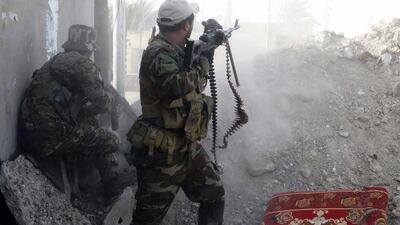A ransom payment from Qatar to an Iraqi militia was equivalent to half the outfit’s annual payment from Iran, fuelling fears its hand has been strengthened ahead of May’s elections.
A trove of hacked messages published by The Washington Post this week indicate Qatar paid hundreds of millions of dollars to some of the US’ most ardent enemies in the Middle East to secure the release of more than 20 Qatari citizens held hostage by a Shiite militia in Iraq.
The messages claim that millions paid by Qatar went to a senior leader of Kataib Hezbollah – an Iranian-backed Shia group designated a terrorist entity by the US. It was handed over alongside millions of dollars transferred by Doha to Jabhat Fatah Al Sham, the group formerly known as Jabhat Al Nusra – the Al Qaeda affiliate in Syria.
The group’s leader, Jamal Jafaar Mohammed Ali Ebrahimi, who goes by the name of Abu Mahdi Al Muhandis, was sentenced to death in abstentia for his role in the 1983 bombing of the US and French Embassies in Kuwait which killed 5.
Kataib Hezbollah itself was designated a terrorist entity by the US State Department in 2009, amid claims it was responsible for "numerous terror acts", including a 2008 rocket attack that killed 2 UN workers. However, in recent years amid the battle against ISIS, it has become a semi-official entity as part of Iraq's Popular Mobilisation Front (PMF) – a group of militias used in the fight against ISIS.
__________
Read more
The Iranian militias fighting in Syria
Qatar’s $275 million ransom went to US' most ardent foes in Iraq and Syria
__________
However, Alex Mello, a security analyst at Horizon Access, told The National that the group’s incorporation into the Iraqi security apparatus hasn’t stopped the group from pursuing its own interests. “Though they have been officially integrated into the Iraqi security sector, [Kataib Hebollah] and related groups continue to pursue their own independent sectarian agenda and are still linked in to Iran’s regional network. This has included kidnappings, assassinations, extortion rings.”
“The addition of $25 million from the Qatari ransom deal would have given them a valuable additional source of funding in addition to what they receive under the PMF budget”, Mr Mello added.
Michael Pregent, adjunct fellow at the Hudson Institute, and a former US military intelligence officer notes that such a ransom payment would significantly add to the designated group’s funding from its Iranian sponsors. “It’s equivalent to half of what the IRGC is paying them on the annual basis”.
He adds it demonstrates just how trusted the group are by Qassem Soleimani, the head of the IRGC’s external operations wing – the Quds Force. “It shows who Qassem Soleimani trusts to carry out special operations. Kataib Hezbollah has become his special operations team. They maintain that ability to kidnap and assassinate – they are his specialised unit,” he adds.
The reports claim that Zayed bin Saeed Al Khayareen, Qatar’s ambassador to Iraq, was in direct contact with members of the group during negotiations, with a figure of $150 million initially discussed. In the end, at least $25 million was paid to a senior member of the group.
Sami Al Askari, a former senior advisor to Prime Minister Nouri Al Maliki, who is running for election on Mr Al Maliki's State of Law list, told The National "Anything that makes armed groups stronger makes me worried."
He added that with elections looming, any parties or groups vying for power must lay down their weapons before they can participate in the political process. “Arms have to be in the hands of the government. The current armed groups have to disarm, and then they can become political parties involved in the political process as politicians, not as armed groups.”
Mr Pregent noted that the group’s Iranian links undermine Iraq’s sovereignty. “Abu Mahdi Al Muhandis is designated terrorist and deputy leader of the PMF, his ties to the IRGC are clear. It’s embarrassing for the US, that this is facilitated by the US funded and equipped ISF (Iraqi Security Forces)”.
“Groups like Kataib Hezbollah and Asaib Ahl Al Haq, and everything else undercuts Iraq’s sovereignty, this current political climate in Baghdad undercuts Iraq’s sovereignty.”
Rasha Al Aqeedi, non-Resident Fellow at George Washington University’s Programme on Extremism, notes that groups like Kataib Hezbollah are contributing to the creation of a sub-state within Iraq. "The widespread optimism following the military defeat of ISIS needs to be objectively reviewed. Iraq is closer than ever to having an overt parallel state which freely operates with other countries".
Though the group is not officially running in May’s elections, several senior members are standing on a list known as the Fatah alliance. As Mr Mello notes, “the case of Kataib Hezbollah serves to demonstrate that groups competing in the upcoming elections also continue to operate independently as armed militias and often come into conflict with the formal Iraqi security forces”.


